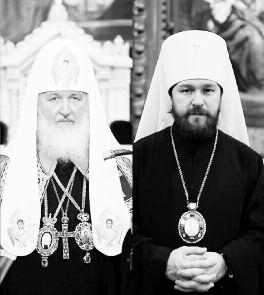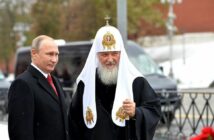
His Eminence Metropolitan Hilarion of Volokolamsk with His Beatitude Patriarch Kirill of Moscow.
Source: The National Herald
By Theodore Kalmoukos
BOSTON, MA – The Moscow Patriarchate’s Metropolitan Hilarion of Volokolamsk, spoke with TNH about the Orthodox Church’s Holy and Great Council, scheduled to begin on June 16 in Chania, Crete.
Essentially, Metropolitan Hilarion is first in ranking after His Beatitude Patriarch Kirill of Moscow and All Russia. The interview follows.
TNH: Your Eminence, what are your thoughts about the upcoming Holy and Great Council?
MH: The Holy and Great Council ought to be the most wide-ranging and representative of the Councils of the past thousand years. It was been in direct preparation for more than half a century, and should become a historical event…The unity and unanimity, which, God willing, we will bear witness to at the Council, is not the end, but the rather the beginning of joint labors on the path to deepening fraternal cooperation between the Local Churches and the strengthening of pan-Orthodox unity. The great responsibility for a successful Council rests upon us.
TNH: What is the significance of the Council for the Orthodox Church as a whole and for the Church of Russia in particular since this is the first time the latter will participate in such a synod?
MH: It is a Council of the whole Orthodox Church, and therefore I would not say that its significance is any different for the Russian Church than for the other Local Churches. First of all, the fact that it is being held is a confirmation of our ecclesiology, it bears witness to us and the whole world that the Orthodox Church is a catholic Church…and the Council is also a visible expression of Church unity, testimony that in spite of the different political conditions in which the Local Churches live, we are capable of achieving unanimity on the most important issues, since we comprise one Church.
TNH: What concerns that today’s faithful have do you anticipate will arise at the Council?
MH: The Council will not examine any topics other than those that have been put on the agenda. The sole exception is the Encyclical, the draft of which still has to be finalized. If we look at the agenda items, the most relevant, in my opinion, is the “The Mission of the Orthodox Church in the Contemporary World.” It gives the Church’s view on the many challenges of the modern-day world, the problems of the economic crisis, on what the Church thinks of the problem of discrimination, and military conflicts.
TNH: What do you say to those hierarchs, monastics, and priests in Greece who oppose the convening of the Council? Do you have similar cases in your Church?
MH: I know that in the Greek Church and the other Local Churches there is a critical attitude by some of the episcopate, clergy, and laity toward the Council, both in process and regarding some of its draft documents.
I will not evaluate this criticism here…as it would be wrong to interfere in the internal life of another Local Church. I can only say that among the bishops, clerics and laity of the Russian Church there is also a critical attitude toward the Council. I believe that criticism of the conciliar documents, if it is constructive and founded, is completely normal. This is why the draft documents were published, so that every interested member of the Church can have his say on them. Moreover, I believe that the more important critical remarks should certainly be taken into account and the corresponding amendments should be made in the documents when they are discussed at the Council. This is vital if we want the conciliar documents to be accepted so that as a result they will not be later rejected by the people of God.
TNH: Could the Synod discuss issues such as a priest’s second marriage, rediscovering the ancient Church tradition of bishops who marry, deaconesses, and a common celebration of Easter?
MH: As I said, no other topics and issues, apart from those on the agenda, will be put forward for discussion. At January’s assembly of First Hierarchs of the Orthodox Churches in Chambésy, the calendar issue was removed, and the issue of reinstituting deaconesses was not even discussed. Thus, these two topics will not be reviewed at the Council. As for second marriage for clergy and a married episcopate, the already-prepared and published draft document “The Sacrament of Marriage and Obstacles To It” does not provide for any reforms in these areas.
Some attendees may propose similar amendments during discussions, but I am confident that such proposals, which would entail such important changes of the Church canons, will not be accepted by the majority of the Local Churches, including the Russian Church. I think that we should all remember that the aim of the Council is to strengthen Church unity and not to undermine it by proposing reforms which go against already established Church tradition.
TNH: Has the issue been resolved between Antioch and Jerusalem over the jurisdiction of the Archdiocese of Qatar?
MH: As far as I know, no positive resolution of this issue that is acceptable to both sides has yet been found, though I hope one will. For this reason the Church of Antioch probably will not participate in the Council’s work.
TNH: How are the relations between the Patriarchate of Moscow and the Ecumenical Patriarchate of Constantinople?
MH: For the Moscow Patriarchate, the Church of Constantinople is the Mother Church.
For many centuries, the Russian Church was part of the Patriarchate of Constantinople. This circumstance makes our Churches especially close to each other, and at present, in spite of the differences in views concerning certain issues, the mutual relationship between the Patriarchates of Moscow and Constantinople is at the highest level.



